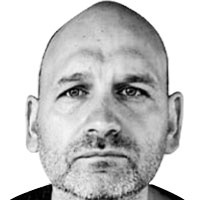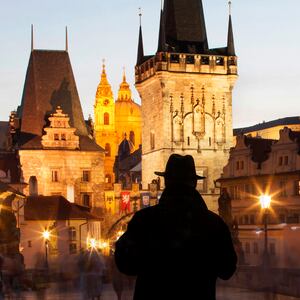Petr Fiala has powerful early memories of tanks. In August of 1968, the Soviet Army invaded Czechoslovakia and crushed an uprising against the Soviet Union’s dictatorial rule. More than 100 people died in the street while resisting the soldiers.
Back then, Fiala was just 4 years old, but he can still recall his parents’ shock and distress, which lingered long after the Soviet soldiers had withdrawn to their nearby barracks.
Now, Fiala is 57 and prime minister of the Czech Republic, which split peacefully from Slovakia in 1993. The Soviet invasion that went down in history as the “Prague Spring” has left Fiala extremely vigilant when it comes to Russia.
ADVERTISEMENT
This is why Fiala did not hesitate when the idea of going to war-torn Kyiv to meet Ukrainian President Volodymyr Zelensky came up at the European Union summit in Versailles.
“I saw the Soviet tanks in the streets of Prague and I know very well what it did to my country for the next 20 years. I don’t want to see Russian tanks here or anywhere else in Europe again,” Fiala said in an exclusive interview with The Daily Beast.
“If we don’t beat him [Putin], he will not stop in Ukraine. He will roll on and will recreate the USSR.”
Last week, three NATO prime ministers traveled by train to Kyiv to show support for Zelensky in person. Polish Prime Minister Mateusz Morawiecki and Slovenian Prime Minister Janez Janša joined Fiala on the highly unusual journey into a warzone.
Here in the Czech Republic, Fiala is seen by his adversaries, as well as some of his supporters, as too dry, bookish and almost robotic in his public appearances and speeches. Now the former university professor has done something many people found shockingly brave, and others described as stupidly dangerous. Ignoring the warnings of his secret service, he put on a bulletproof vest and a helmet, and boarded the train to Kyiv.
It was a tense ride. Sirens went off while the train was stopped near the western Ukrainian town of Lviv, warning everyone of an imminent Russian missile strike.
“The prime minister looked calm but I was afraid; can’t say otherwise,” Fiala’s chief of staff Václav Smolka told me with a nervous laugh.
They made it to Kyiv unscathed and were transported in a convoy of cars to a bunker-like facility where Zelensky met them. Smolka said it was like a ghost town, and that there were many checkpoints and barricades within the city. The delegation caught glimpses of damaged residential buildings that had been hit by Russian bombs or missiles.
Fiala admits he began to get emotional as he witnessed the scale of the destruction. He had seen some of Zelensky’s speeches to the European and British parliaments and to the U.S. Congress, and had felt moved. Meeting Zelensky in-person, Fiala saw obvious exhaustion in him, but he also observed rational determination and strategic thinking.
“These qualities of his can be, at the end, decisive and it filled me personally with a great hope,” says Fiala.
He came back to Prague with one urgent priority—weapons delivery to Ukraine, especially anti-tank and anti-aircraft missiles. “If they [Ukranians] have enough of these weapons they can create their own no-fly zone,” said Fiala.
“But they need these weapons not in months, weeks, not tomorrow, they need them now. I think even rich countries did get it. I have seen in the last 10 days a big shift in their thinking. They did send weapons.”
Besides weapons, it is economic sanctions that Fiala and the other leaders from Eastern Europe see as a powerful tool to defy Putin. “I think it was us in the East, our storytelling and historical experience, that ultimately led the whole of Europe to impose the sanctions against Putin’s Russia,” Fiala said.
For a brief moment during the interview, Fiala went further back into history, this time evoking a different era: Sept. 30, 1938. On that day, the Munich Agreement was signed, essentially giving Czechoslovakia away to Adolf Hitler. The Western powers thought this would appease Hitler and prevent war in Europe. They miscalculated.
“We in Eastern Europe tell our allies in Western Europe that we have to stand up against this [Russian] aggression and remind them that in the past we didn’t and it was a disaster,” Fiala continued.
“No doubt, there is a difference between our historical experience and theirs. Every time we meet now, we try to convey this experience to our western partners. And, I believe that the West is listening this time around.”
It is now easy to find Czechs who give Prime Minister Fiala a thumbs up for his attitude toward Putin and for his brave trip to Kyiv.
“It makes me very proud. Finally, the head of our state did something extraordinary, showing a lot of courage and a big heart,” Prague veteran Kamil Prašný told me as we walked by the Czech National Radio building in Prague, a site that has seen bloody uprisings against both Nazi and Communist regimes in the past.
Prašný recalled the radio broadcast that cried for help in 1968 to defend the station against Russian aggressors so it could still provide Czechoslovaks with independent information. He heeded the call and rushed to the city center to confront the Russian troops. But history tells us the USSR prevailed, and freedom eluded the Czechs and Slovaks for another 21 years. “We must support Ukraine now. They do fight for us as well.”
Prague appears to be firmly on the side of Ukrainians. Blue and yellow flags can be seen in many windows, on flagpoles or on the front of buses and trams. Even some street signs have been replaced, unofficially. One street in Prague that has been for decades called Russia has been renamed by Prague residents: “Russian battleship, go fuck yourself.”
It is an allusion to the Ukrainian soldiers on Snake Island who told a Russian Navy vessel in the Black Sea where to go at the start of the conflict. The new signs are now up along the entire two-mile length of this street. Some residents proudly show letters and postcards they have just received with their new address.
“It’s great to see that the state postal service is on board with this unofficial name and delivers mail to us, to an address that actually doesn’t exist,” said a young man who was about to jump on his motorbike in front of his building located on the renamed street.
Prime Minister Fiala doesn’t use such colorful vocabulary but when it comes to Putin his voice has a steely tinge.
“He is a war criminal. We must isolate him, we must isolate the whole of Russia. This is the only way we can win this war. And, I believe Putin will be held accountable for his crimes.”







